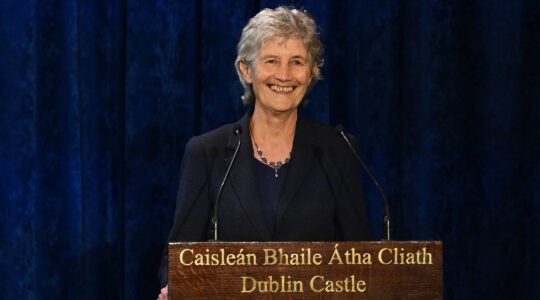COLON FREE ZONE, Panama (JTA) – While conflicts in the Middle East make the prospect of peaceful coexistence between Jews and Arabs seem distant, a walk along the crowded streets of this trading zone shows Jews and Arabs can get along.
Inside the stores here – wholesale distribution centers for Asian goods seeking Latin American importers – businesses run by Orthodox Jews and Arab Muslims operate side by side with nary a hint of conflict. In some cases, businesses are co-owned by Jews and Arabs.
“We all came to Panama to work and for reasons of prosperity, but we are all allowed to work and no one interferes,” said Allan Baiten, a second-generation Jew and a consultant to businesses here. “Once upon a time we were all brothers, and we continue to be.”
Unlike other parts of the world where devoutly practicing Jews and Muslims have come into conflict, in Panama the two are almost symbiotic. Saturday nights find Panamanian Jews enjoying meals at Arab-run restaurants with halal-certified food. Nightclubs are packed with young Jews and Arabs more concerned about partying the night away than the faith of their fellow partygoers.
Here at the free zone, a stone’s throw from the Caribbean near the northern mouth of the U.S.-built Panama Canal, that spirit spills into the high-stress world of business. The free zone continues to be a linchpin in Latin American commerce, but the era of free trade and Internet purchasing has put the squeeze on business owners who now compete not only for customers but also for goods, prices and logistics. An increasing amount of business is done on consignment.
That, merchants here say, has led to increased stress levels but also a greater sense of kinship among merchants, no matter their religion.
All agree that one key to that kinship is avoiding the issue of conflict in the Middle East. Panama’s Jews are known for their support of Zionism while its Arab community is know for displaying support for the Palestinian cause.
“You don’t touch on that issue,” said Mordejai Burstein, sales manager at the fabric firm Tex Tela, a midsized company nestled among appliance distributors here. “So long as that issue is not touched, there are no problems.”
Geography also plays a role in the good relations. Nearly all of the 9,000 Jews in Panama live in Panama City, on the Pacific Ocean, while the estimated 10,000 Muslims are concentrated mainly in Colon, on the Caribbean, and in the western provincial city of David, near the Costa Rican border. The mosques in Panama tend to follow moderate strains of Islam.
As Baiten noted, many of the Jews and most of the Arabs trace their roots back to present-day Syria, a geographical coincidence that helps unite the two groups in this predominately Catholic country.
But for all the excuses that could serve to dismiss the social harmony as a product of circumstance, there is an underlying desire to get along, says Ezra “Sury” Hafeitz, the owner of the Panama City fabric store Bazar Pico-Pico and a leader in the local B’nai B’rith chapter.
“There is a code of respect here to not interfere or make religious comments,” Hafeitz said. “Here we respect one’s religion and do not seek out conflict.”
The good relations have found themselves strained at times, especially after a 1994 bombing of a commuter flight that killed 10 Jews, an unsolved bombing blamed by some on Hezbollah and by others on Colombian drug cartels. But tensions eased when most Arabs joined the rest of the country in condemning the attack.
With three Jewish congregations – two Orthodox and one Reform – and thousands of kosher and Sabbath-observant Jews, Panama stands out in Latin America as having one of the most devout and practicing Jewish populations. Muslims are as practicing as their Jewish counterparts here; synagogues and mosques are under construction to attend to the ever-growing flocks.
The respect between Panamanian Jews and Muslims is mutual. The country’s grand rabbi and the local imans say they speak on the phone, and local Jews say they have never felt victimized by Muslims.
“They want to maintain a good level of friendship and respect, above all, between the two communities,” Baiten said of the Muslims.
Panama, he said, “is a showcase of tolerance.”
JTA has documented Jewish history in real-time for over a century. Keep our journalism strong by joining us in supporting independent, award-winning reporting.





